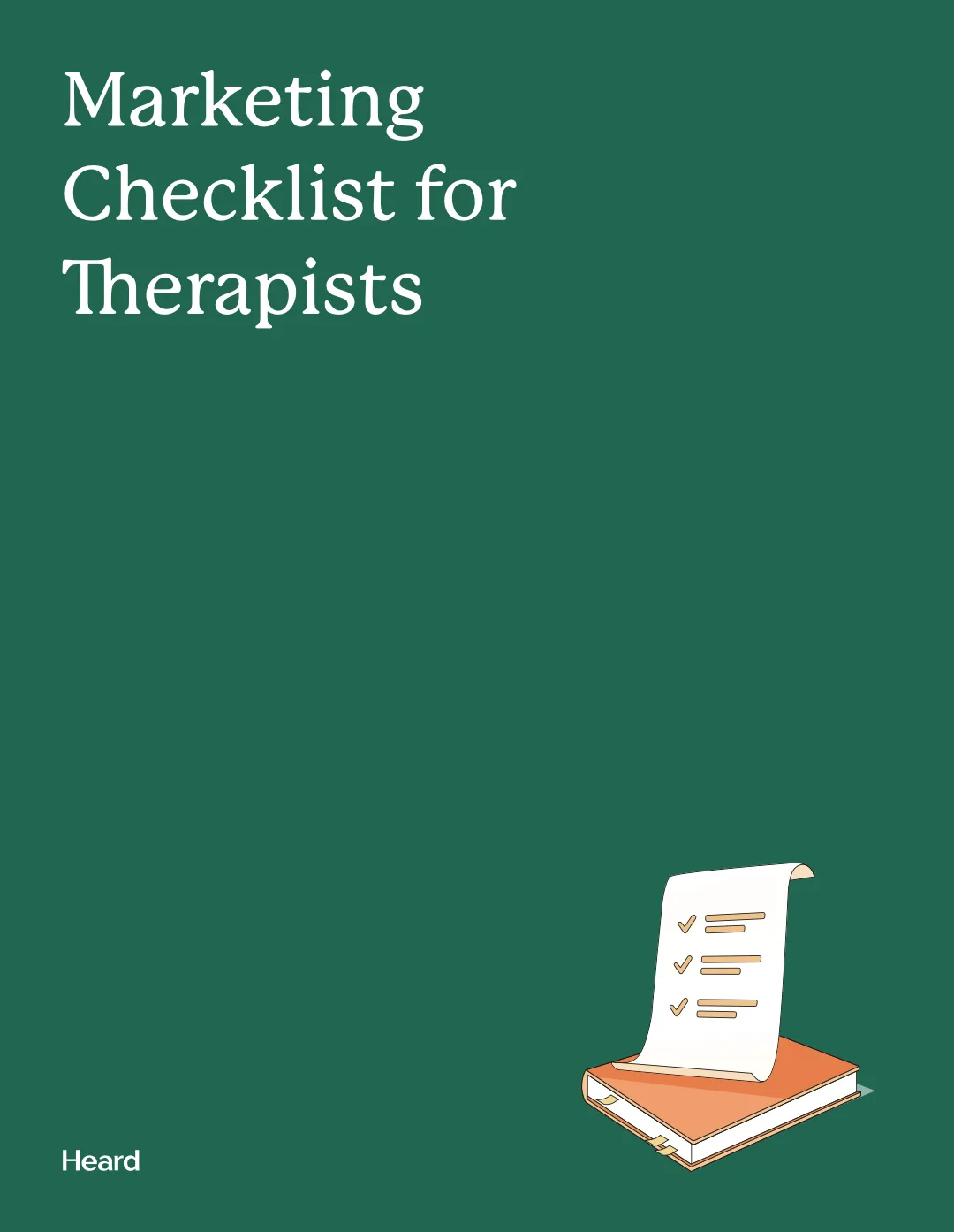Getting referrals for your therapy practice is one of the simplest, least expensive ways to fill your caseload.
By planning carefully and connecting with the right professionals, you establish a steady stream of new clients perfectly suited to your modalities, specializations, and treatment styles.
It’s win-win: your practice turns a profit, and you work with those most likely to benefit from your particular skills as a therapist.
Here are seven steps you can take right away to start bringing in more referrals.
{{resource}}
A note on ethics
If you run a gym and offer members a cash reward for sending new clientele your way, no-one blinks an eye.
Therapy is different. There are a couple of major ethical guidelines to be mindful of when soliciting referrals.
No rewards
Offering a cash kickback—or any other type of reward—in exchange for referrals is strictly against the rules. That extends to colleagues, other care professionals, and past and current clients. You can’t pay people to tell others you’re a good therapist.
No pressure
It may feel natural to encourage clients to send their friends and family to you for help. But what may seem as a friendly invitation on your part could feel to your client like unwanted pressure. It damages the therapeutic relationship, and it’s unethical.
No soliciting reviews
It’s unethical to ask clients to leave you reviews of any kind on Google, Facebook, or other platforms.
Luckily, all of the seven strategies below are ethical, as well as highly effective at getting more referrals.
Narrow your niche
The more specific you are about what types of clients you aim to work with, the more straightforward marketing your practice becomes.
Narrowing your niche prevents you from two major problems new practices run into when it comes to referrals.
Unqualified potential clients
You get an avalanche of queries from clients who are outside your areas of specialization, so you’re always turning away clients even though there’s room in your schedule to take on more clinical work.
Wasted time/energy
If your focus is on treating youth, you’re unlikely to get qualified referrals from Meals on Wheels. Without a clear focus, you could waste your time establishing referral relationships that don’t benefit your practice.
On the flipside, narrowing your niche comes with positive benefits.
More of the same
When you work with clients within a specific niche, there’s a good chance they’ll refer others within the same niche to your practice. For instance, if you focus on working with overworked small business owners, your clients may refer their fellow business owners to your practice, so you can continue working with your favorite type of client.
Deepening specialization
As you continue working within your niche, you have the opportunity to develop skills and methods especially suited to that type of client—essentially, becoming better at what you do.
In order to narrow your niche, write out a profile of your ideal client. Who would you most like to work with? Who would most benefit from your skills? That ideal client profile should serve as a guideline as you work to grow your personal referral network.
Set up your referral plan for clients
While you shouldn’t pressure clients to refer others to your practice, you can certainly make it known that you’re accepting new clients and that you’re focused on helping particular groups or people facing particular issues.
In order to bring it up in an appropriate way that will avoid pressuring your client while also ensuring they keep your services in mind:
Decide when to bring it up
Will you mention you have space on your list only after clients “graduate,” and leave treatment? Or will you mention it at some point during the course of treatment?
Choose a time outside of treatment hours
Your client’s time with you should be focused on their own mental health journey. If you’re going to mention you’re open to referrals, do so either right before the session begins, or afterwards.
Keep it light
You’re not trying to sell your client a timeshare. Mention your availability, and the types of clients you primarily treat, then move on.
Keep business cards or fliers available in your office waiting room, or include a prominent link and contact info in the signature of your email if you exclusively see clients online.
Finally, be sure to follow up. If a new client comes to your practice, and they’re a great fit for your services, and they happen to mention another client of yours sent them your way—show your gratitude. A handwritten thank you note or card for your first client is totally acceptable, and they’re sure to appreciate it.
{{resource}}
Network with the right professionals
Be proactive meeting with professionals in related fields and letting them know you’re open to new clients. Don’t wait around for them to learn about your therapy practice on their own.
Whether it’s with a handshake and a business card, or a full-blown business lunch, make sure they know you have capacity for new clients and that you may be able to help some of the individuals they work with.
And, importantly, focus on networking with professionals who fit your niche.
For instance, if you specialize in helping LGBTQA+ youth, you might talk to school counselors, youth drop-in center organizers, or organizers at local affirming churches—but it’s unlikely you’d take time to network with care workers at a senior living facility.
On the other hand, if you specialize in geriatric psychology, the local senior care facility may be your first stop. You might also talk to organizers of social events and classes for seniors in your community.
Networking with other therapists
Finally, take the time to network and get to know other therapists in your community. Even if your niches don’t overlap, they may meet potential clients (or learn about friends and family of clients) who would benefit from your services, and be happy to send them your way.
It’s a two-way street, though. Make it clear that you’re prepared to provide referrals if you meet clients who would benefit more from their services than yours.
Invest in events
It may cost you in time, effort, and cold, hard cash to attend events professionally, but it has the potential to pay off in the form of new referrals.
Treat business events as investments. That includes:
- Conferences, where you can meet other therapists and professionals in related fields
- Community events, like career days at local schools or health and wellness fairs
- Online workshops and lectures with a social aspect (e.g. the chance to meet and talk to other attendees)
By showing up at events and sharing information about your business, you’re increasing your practice’s visibility overall. And the more events you attend, the more comfortable you will become with networking.
{{resource}}
Create your own speaking opportunities
Speaking in front of a group of potential clients is a surefire way to drum up referrals.
The people in your audience don’t need to be actively seeking help, or even fall within your particular niche as a therapist. What’s important is that they learn about your practice, see some of your expertise as a therapist on display, and remember you.
Then, when the topic of therapy comes up with friends or family, you’re top of mind.
For example, you could try offering:
- Free lunch-and-learns for local businesses, addressing topics like workplace stress and work-life balance
- Mindfulness workshops at the local library or community center
- Q&A live streams on social media, where you answer anonymously submitted questions about mental health
- Exam time stress-busting workshops on college campuses, sharing strategies for navigating performance anxiety and burnout
- Journaling and self-reflection workshops for almost any group of people: new parents from the local toddler morning care program, teens from the youth drop-in center, addictions recovery groups
Be creative. There are many people who aren’t necessarily looking for a new therapist, but who would benefit from the chance to learn more about mental health from a professional like yourself.
Get credentialed with insurance companies
Getting credentialed with an insurance company automatically enters you into a brand new referral network.
Once you’re paneled with an insurance company, they’ll refer customers on their medical plans to your practice. These referrals could take the form of a directory of insurance-accepting care providers, or an interactive map or app that helps customers find your practice.
Check out our Complete Guide to Credentialing for Therapists.
Consider joining a therapy network
At the most basic level, therapy networks act as online directories for therapists to be discovered by potential clients. They’re a kind of Yellow Pages specifically for mental health professionals. Psychology Today is the most popular example.
But other networks offer particular formats or tools for helping clients and therapists connect:
- The Consult List makes it easier for clinicians to refer clients to available therapists. By joining the network, you make yourself available to accept qualified referrals.
- Open Path Collective is dedicated to helping clients find therapists with affordable and sliding-scale fees.
- Inclusive Therapists helps clients connect with therapists who specialize in helping traditionally underrepresented groups.
You can learn more about online directories from our Complete Guide to Marketing for Therapists.
Therapy network caveats
The cost of listing your practice varies from one network to another. Make sure you take the time to understand all of the costs involved—and all of the services provided—before choosing a particular therapy network.
A large number of networks have recently emerged in the wake of the online therapy boom and the growing visibility of mental health in general. Some, like BetterHelp, have run into problems due to unscrupulous business practices. It pays to investigate a network’s reputation before signing up.
—
Referrals are just one tool for helping your practice get off the ground and running. For more inspiration, check out our 101 Marketing Tips for Therapists.
This post is to be used for informational purposes only and does not constitute legal, business, or tax advice. Each person should consult their own attorney, business advisor, or tax advisor with respect to matters referenced in this post.
Bryce Warnes is a West Coast writer specializing in small business finances.
{{cta}}
Manage your bookkeeping, taxes, and payroll—all in one place.

Discover more. Get our newsletter.
Get free articles, guides, and tools developed by our experts to help you understand and manage your private practice finances.





